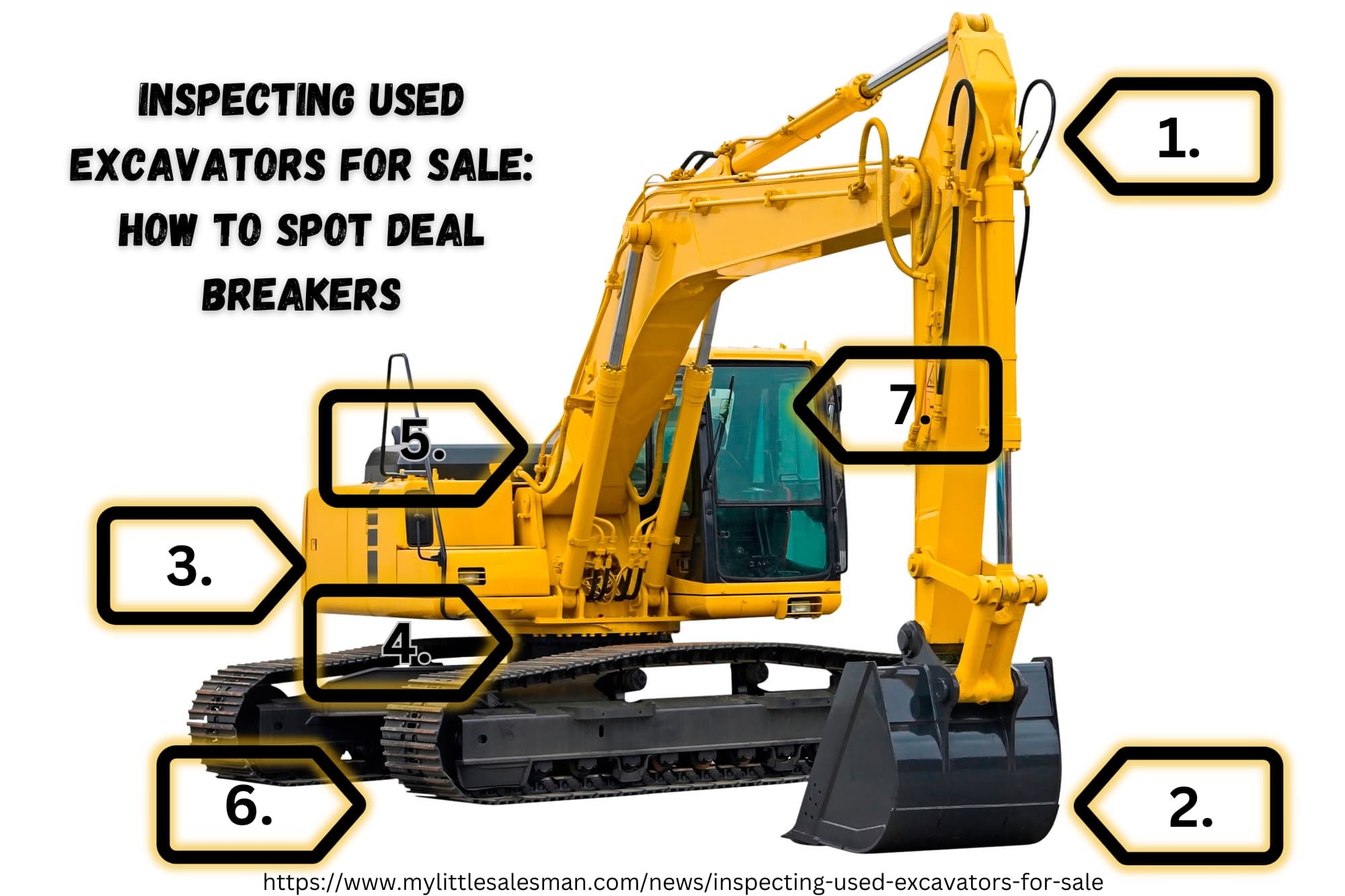
Eyeing a used excavator for sale? Let's first see if it's worth your mechanic's inspection fee.
Before you spend real money having a professional inspect an excavator you're considering, knowing a deal-breaker when you see one can save you some serious scratch.
Consider this your guide your buddy telling you what to keep any eye out for while giving any used excavator for sale a first-look. As such, it's no substitute for a professional's eye. Still, let's see if we can save your mechanic some time (and some of your paycheck).

1. Boom and Stick: Inspecting Your Excavator's Arms
Imagine these as the excavator's arms. You wouldn't let your grandpa swing around with rusty old pipes, would you?
Inspect the boom and stick for cracks or welds that look like someone took a blowtorch to a Salvador Dalí painting. These metal muscles need to be strong, not looking like they're ready to crumble.
2. Bucket Basics: Inspecting the Excavator Bucket
Think Goldilocks: Is the bucket the right size for your projects? Tiny buckets won't budge boulders, and giants won't finesse landscaping.
Give it the once-over: Dents, cracks, too many missing bucket teeth, or Frankenstein-style welds are red flags. A patched-up bucket is like a wobbly ladder—best left unused.
3. Engine and Hydraulics: a Good Ticker
Pop the hood and have a good look around.
Engine oil should be clean and at the right level. Dipsticks and gauges tell their own story. Leaky hoses and pumps are bad omens—gremlins in the hydraulic system, causing mischief.
4. Pin Pals: Inspecting the Pins and Bushings
The pins hold everything together, so keep them happy! Look for signs of regular greasing—think smooth and shiny, not dry and dusty like your highschool sports trophies in the attic. Neglected pins lead to grinding noises and wobbly joints—not the soundtrack you want on your worksite.
Also make sure to inspect the swing bearings, also known as slew ring bearings—the component that allows the upper section of the excavator to swing 360 degrees. Inspect the hydraulic excavator housing for oil leaks and make sure everything spins smoothly. If the upper spins in a jerky motion or unusual sounds like your knees in the morning, this could spell wear or neglected maintenance for said digger.
5. Hydraulic Cylinders: The Veins and Arteries of Your Excavator
The cylinders are the lifeblood of this beast. Think sleek and smooth, not leaking oil. Oil seepage means trouble—a scratched cylinder or worn seals, both bad news for performance and reliability.
Any signs of hydraulic pump damage or hydraulic leaks should raise some eyebrows as they may later lead to steep maintenance costs.
6. Inspecting the Tracks: No Time for Creepy Crawlers
Your tracks are the unsung heroes keeping your excavator from doing the limbo under a pile of dirt.
Check the tracks for loose pins and bushings, as these guys hold the whole show together. Slacking pins mean a saggy excavator. Look over the track frame, track shoes, and if the excavator has rubber tracks, look them over for damage.
Don't forget the final drive and ring gear—as wear and leaks can lead to some mechanical tantrums down the line.
7. Cab Comfort: The Captain's Cabin
Don't forget where you'll be spending your days! Cracked glass, dented sheet components, and rusty beams are more than just eyesores—they can affect safety and comfort.
As for the seat, levers, and control pedals, you'd be surprised by how much they can say about an excavator—almost as much as any service meter or odometer. While a seat and control knobs can be replaced, they may tell you just how rough or "well loved" an excavator has been from past operators.
Remember, a happy operator is a productive operator.
Remember: this is just the tip of the iceberg.
When it comes to used excavators, a little know-how and a healthy dose of skepticism go a long way. Don't be afraid to get dirty, ask questions, and trust your gut.
In the market for a used excavator for sale? Say no more.
If you're in the market for a used excavator for sale, you're invited to find precisely what you're looking for in just a few clicks. Using user-friendly search filters, you can pinpoint makes, models, years, budgets, and all measure of specifications on the heavy equipment marketplace from your friends at My Little Salesman. Since 1958, My Little Salesman has been connecting buyers with sellers of heavy equipment and commercial vehicles—all over North America and beyond.